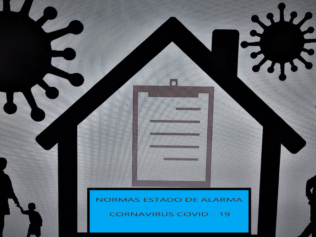PROTECTION MEASURES FOR VULNERABLE ADULTS WITH DISABILITIES
REFORM OF LAW 8/2021 IN RELATION TO SUPPORT FOR VULNERABLE ADULTS WITH DISABILITIES
Law 8/2021 on the reform of procedural and civil legislation to support persons with disabilities (PWD) in the exercise of their legal capacity aims to adapt Spanish legislation to the paradigm shift stemming from the principles and regulations contained in international legislation in general and in particular article 12 of the New York International Convention on the Rights of Persons with Disabilities (NYC) 13-12-2006, ratified by Spain on 23-11-2007.
In this article we will make a brief reference to the main new developments to give an overview of them.
After the reform (although also beforehand by virtue of the application of international legislation ratified by Spain), the principle that must inspire both the request for support measures and their adoption, in voluntary or extrajudicial and judicial proceedings, is that of absolute respect for the will, preferences and tastes of the person with a disability.
In this way, the objective of the presently named supports is to facilitate the exercise of the legal capacity of the person with a disability, which in no case can be limited, as this is inherent to every person and therefore cannot be conditioned or restricted in any way. It is a different matter if, according to the particular circumstances of each case, a person with a disability may need a complement or help in the exercise of that inviolable legal capacity, and therefore the provision of support, individualised and adapted in detail to the specific situation, takes on special prominence and importance, as an element designed especially for every instance, without any further standard or generalised solutions or measures, as was previously the case.
This support will be predominantly assistance support and only in cases where granting representative powers is essential in the designation of supports.
The possibility of “incapacitating” a person with a disability is now completely ruled out, as it is considered contrary to the respect for his or her dignity as a person.
Voluntary or extra-judicial and judicial proceedings are now offered to meet the specific needs that may arise for persons with disabilities:
- a) VOLUNTARY MEASURES, to which Law 8/21 gives preference as they respect the principle of personal autonomy, which is central to this matter, among which the following should be highlighted:
a.1) Preventive powers of attorney, which may be granted for situations of disability already present at the time of granting or to prevent them from arising. They may include supports and measures relating to the person and/or assets and may also include safeguards to prevent abuse, conflict of interest or undue influence, as well as control mechanisms. These measures are to be placed on record in the Civil Registry.
a.2) Self-curatorship, by means of which the grantor chooses in a notarial document the person or persons he/she wishes to provide him/her with assistance or even representative support if necessary, in a supervening situation in which he/she may need it, being able to include all kinds of instructions to this end.
a.3) Support agreements, in which the person agrees with the person who is going to provide him/her with specific support the way in which, according to his/her will, tastes and preferences, he/she wants it to be provided.
- b) JUDICIALLY ADOPTED MEASURES, which are subsidiary measures to be adopted in the absence of voluntary measures:
b.1) Appointment of a curator, who may be for assistance or a representative and may be appointed either through a voluntary jurisdiction proceeding or through the corresponding contentious proceeding.
b.2) Appointment of legal counsel.
b.3) Application for authorisation for one-off events, generally of an economic-financial nature.
In addition to the above, the provision of support must include all types of actions that help the person with a disability in the exercise of his or her legal capacity, whatever the nature or type of support required, whether personal or technical, as long as they facilitate the understanding and intervention of the person with a disability in making decisions that affect him or her.
In no case can a declaration of incapacitation of the person with a disability be made.
On the basis of the above, the procedures are modified and the voluntary jurisdiction proceedings are now considered as the preferential judicial channel for the designation of support in the absence of voluntary measures.
The following is a brief outline of the main support figures:
DE FACTO GUARDIANSHIP:
One should note the relevance and role of a crucial support, the de facto guardian, a support that is often not documented because perhaps the person in a situation of supervening disability could not foresee this and therefore could not formalise any choice before a notary, nor does it require judicial appointment.
Not only has the practical reality of everyday life long since made the de facto guardian the most frequent and closest figure of support, but also the legal reform of law 8/2021 recognises this reality, reinforcing this figure.
Notwithstanding the above, the need to prove to some institutions or enterprises who is the de facto guardian cannot be ignored, as it is so common in the case of going to a bank branch to be able to assist the disabled person in meeting his or her needs. Since, as mentioned, this does not require judicial appointment, it is complicated in practice to prove this fact, so that in the absence of a specific regulated solution, one option could be to document in a notarial deed who acts as de facto guardian, either with the declaration of the person with a disability in the event that with the necessary personal or technical support they can communicate their preferences in this respect, or with the declarations before a notary by close witnesses, with the particularities of the specific case naturally having to be taken into account.
Furthermore, it is foreseen that the de facto guardian as such can apply for judicial authorisation to perform legal acts in the interests of the person with a disability, as well as the judicial authorisation can exercise supervision and control over the de facto guardian in the performance of his or her duties.
CURATORSHIP:
As indicated above, the curatorship can be provided for in a notarial document by the person with a disability himself or herself – the self-curatorship- in which he or she not only appoints the guardian but can also detail everything that corresponds to his or her wishes, tastes and preferences, both concerning his or her person and his or her assets, the mode of exercise of the curatorship, whether or not there is remuneration, administration preferences, establish safeguards or control measures, choose who he/she does not wish to intervene in them as well as everything that reflects his/her preferences in the exercise of his/her free will, respecting the principle of respect for his/her self-reliance.
Therefore, these measures have to be taken into account by the judicial authority as long as there are no extraordinary circumstances of considerable importance that would lead to the conclusion that the person with a disability, in the event of knowing these, would not have taken these decisions.
This is very similar to the German law, the Betreuung, which translates as assistance.
Self-curatorship, although a voluntary measure, requires judicial intervention for the appointment of a curator, as it is a formal measure.
In those cases where there is no self-curatorship, it is the judicial body that, considering the particular circumstances of the case, must appoint the person or persons who are to assist and only if necessary represent the person with a disability, adopting support measures for this purpose, specifying in detail the functions and areas of intervention of the curator, making what is repeatedly called a “tailor-made suit”, without the judge being able in his/her work to resort to generic and uniform formulas that in no way meet the needs of assistance and exceptionally of representation that each case requires.
Also in this case, the judicial body must take into account the will, tastes and preferences of the person with disabilities and facilitate for him or her to have access to the necessary personal or technical support to be able to communicate them, as well as take them into account not only for their appointment but also with regard to the aspects related to their exercise, safeguards and development.
JUDICIAL DEFENDER:
The regulation of the judicial defender for persons with disabilities is contained in arts. 295 to 298 of the Civil Code. Traditionally, the figure of the judicial defender fulfilled a function of adjustment of the other institutions of protection of the person, following the basic characteristics of temporality, subsidiarity and coexistence with another figure of support.
However, after the recent reform, the figure of the judicial defender has gained prominence and now he/she intervenes both in cases of conflict of interest and when there is no support figure or the existing one is unable to assist the person with a disability, even if these interventions are recurrent.
In addition to the curatorship, de facto guardianship and judicial defender, regulated in Article 250 of the Civil Code, Article 253 provides for a provisional support measure that corresponds to the public entity that assumes this function for the urgent case in which support for legal capacity is required and there is no de facto curator, which must inform the Public Prosecutor’s Office within 24 hours.
In the event that there are no voluntary measures and it is necessary to undertake actions before a court of law, preference is given to the voluntary jurisdiction proceedings, which will be transformed into contentious proceedings only in the event of opposition.
The reform is extensive and, as indicated above, is intended to reflect a paradigm shift that may still be difficult to put into practice in dealing with institutions and companies in the management of the interests of persons with disabilities.
Nowadays, in an increasingly ageing society, there are frequent cases of supervening disability in which the voluntary self-regulation measures very briefly indicated in this article have almost never been used, which are highly recommendable in order to ensure a better management of the personal and patrimonial aspects of these situations, especially because they consider the preferences, interests and tastes of the person with a disability, without anyone having to substitute their will, respecting their autonomy.
And this becomes especially necessary in cases so frequent in the province of Malaga and its towns ( Estepona, Marbella, Fuengirola, etc), where so many European adults choose to live and enjoy their retirement, far from the family that usually provides the necessary support in cases of supervening disability, so frequent in cases of dementia, Alzheimer’s, Parkinson’s, cerebrovascular accidents or other situations that require effective and rapid care for those affected. It should also be borne in mind that in these cases in which a foreign element is involved, we have to study in detail the Private International Law applicable to the specific case, which can sometimes be as complex as it is interesting.
María del Mar Hernández Cortés, lawyer, member of the Malaga Bar Association, Expert by the University of Malaga in Disability Protection for the Vulnerable Elderly, advises clients in this field in Spanish, German and English.
hernandez-cortes@wf-rechtsanwalt-malaga.de
Tf: + 0034 952 80 44 64









